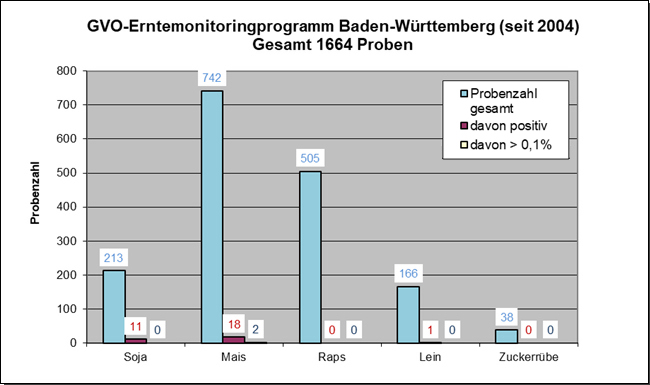News
Baden-Wuerttemberg: No more GMO contamination found in harvest monitoring
The sampling program of the official food and feed monitoring authorities in Baden-Wuerttemberg is carried out annually since 2004. More than 1600 crop samples have been examined for GMO contamination since then. In this context, the authorities examine random samples of canola, linseed, soybeans, corn/maize and sugar beets, as there are genetically modified variants of these plants that are not approved for cultivation in Germany.
In 2020, 10 metric tons of genetically modified seeds were detected by inspection
In 2020, a discovery of genetically modified linseed triggered investigations and measures throughout Europe. It stemmed from a 10-ton seed shipment contaminated with the herbicide-resistant GM linseed FP 967/Triffid - a variety developed in Canada in the 1980s but never cultivated commercially.
Also check for plants from new genetic engineering
"It is gratifying that no more contamination was found in Baden-Württemberg in 2021. The discovery in the previous year shows how important such monitoring is. To ensure that they can continue reliably to monitor the absence of genetic engineering, the authorities must finally also check the random samples for plants from new genetic engineering processes. To do this, they need recognised detection methods," comments VLOG managing director Alexander Hissting.
"Ohne Gentechnik" [Non-GMO] industry counts on Germany’s Traffic Light coalition
"The 'Ohne Gentechnik' industry is counting on the new German government which has written the support of detection research into its coalition agreement. For genetically modified Cibus canola, VLOG, together with several partner organisations, in 2020, already had a functioning detection method developed on its own initiative. It has long been in use at VLOG, among others, but is unfortunately still not used in the official monitoring. At the same time, it is publicly available as open source for use and further development."
Chemical and Veterinary Investigation Office Freiburg: Genetic Engineering Harvest Monitoring 2021 (in German)
Genetically modified linseed: 10,000 kg of seed may be contaminated

